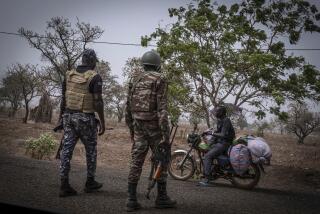Rebel Discontent Simmers in Niger
- Share via
AGADEZ, Niger — It is four years since desert raiders with flowing turbans and flashing sabers abandoned their guerrilla war in Niger’s Sahara Desert and returned to their nomadic calling.
The rebellion by Tuareg tribesmen took hundreds, perhaps thousands, of lives before these pirates of the sand, an olive-skinned people who don’t consider themselves African, buried their Kalashnikovs for government promises to improve agriculture and bring tourism.
But little has been done to ease the Tuaregs’ poverty, and discontent is bubbling again in the desolate north of this politically turbulent West African country of 9.7 million people.
Former fighters like Mohammed Abdullah warn they will revive the rebellion unless Niger’s black-dominated military regime delivers jobs and development aid promised by successive governments.
Abdullah, a burly Tuareg in his 50s, left his job as a university-trained agronomist 10 years ago to become a commander in one of the dozen Tuareg rebel factions.
Like many others, he was promised a plum civil service or military post in the 1995 peace deal. But few jobs materialized in the chaos of two government turnovers, the more recent of which came in April when President Ibrahim Bare Mainassara was gunned down by members of his own presidential guard.
“Our people still have nothing to show for the war. But we will fight again if we have to,” Abdullah said, an indigo blue turban shrouding his dark, bearded face as he drove a battered Toyota utility vehicle used during the war to ferry supplies for the Libyan-backed insurgents.
The Tuaregs’ struggle for a share of Niger’s meager resources is rooted in historic racial and tribal rivalries that remain a delicate issue in the multiethnic country.
Tuaregs, descendants of Berbers and Arabs who roamed the deserts of West and North Africa for centuries, consider themselves white and vehemently dislike being called Nigerien or, worse, African.
“I am Tuareg, only Tuareg,” said Abdullah. “I don’t have a passport and don’t need one. I go anywhere I please in my land. For me it is not Niger, it is my land.”
Until French colonial rule began at the turn of the 20th century, many Tuareg clans survived as nomads, raiding towns and caravans, trading in black slaves and mining salt and silver in the desert.
Since Niger’s independence in 1960, the clans have continued to trek with camels and goats across the Sahara from oasis to oasis searching for water and pasture as far west as Morocco and as far east as Sudan and Egypt. Tribal and national borders are disregarded.
Although vastly outnumbered by other groups--blacks make up 90% of Niger’s population--Tuaregs claim the bulk of the country’s territory across which they still roam, most of it barren wasteland.
Tuareg society treads a fine line of seeking inclusion in Niger’s mainstream economy and political life while trying to retain its cultural heritage by discouraging intermarriage with outsiders.
Even Tuaregs of elite status, like Abdullah--who owns a vehicle and could probably afford a small house--prefer to live in the traditional camel-hide and reed dome tents that provide shelter from the blinding desert dust and heat.
But many are ready for modern development--or at least the comforts that come with it.
For six years, Ibrahim Mohamed slept with his rifle under the stars in the craggy Air Mountains in the country’s north, occasionally sneaking out to smuggle guns from Libya or ambush caravans.
Some days he would have nothing to eat. Other times, he endured frigid desert nights without even a blanket for shelter. Some of his comrades went berserk from shell shock--he smiles as he recalls one rebel shouting “Tin-doom!” and driving his fist into a pot of precious food as if setting off a bomb.
But his wartime hardships were balanced by hopes for prosperity and change. Those hopes have been nearly dashed.
Mohamed, now 33, is unemployed and shares a tent with his elderly mother and young wife in an expanse of tumbleweed in dunes on the outskirts of Agadez, a hardscrabble traders’ outpost between the Sahara and the Air Mountains.
He has no camels and no goats-- essential status symbols for married Tuareg men.
“We believed that if we endured suffering in the war, everything would be all right when peace came. But it is taking too long, and the government needs to know that we fought once and can fight again,” Mohamed said.
For others, drought and dwindling grasslands threaten livestock, for which there is diminishing demand. And they have few alternatives. Job opportunities are scarce.
Tourism, hailed by many Nigeriens as a potential windfall for this country of sweeping deserts and rugged mountains, has failed to materialize. With few tourist facilities and occasional violence and banditry, visitors are staying away from what is one of the poorest and most isolated places on Earth.
The uranium mines in Tuareg-controlled northern Niger have lost their customers in the West with the end of the Cold War, and production has all but stopped.
Niger’s new military leader, Commandant Daouda Malam Wanke, who seized power after several of his colleagues killed the president in April, has promised to speed up development for impoverished Tuareg communities.
His predecessor made similar pledges two years ago, but integrated only a handful of former Tuareg rebels into the cash-strapped army and civil service.
There are few expectations that the hand-over to civilian rule, promised to come before year’s end, will bring much help either.
Abdullah says another rebellion may be necessary to draw government attention to the Tuaregs’ economic plight.
“I love the peace we now have, but I still have my gun, and so do my brothers,” he said. “And we are prepared to use them.”
More to Read
Sign up for Essential California
The most important California stories and recommendations in your inbox every morning.
You may occasionally receive promotional content from the Los Angeles Times.













